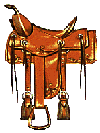

Saddle Up
A good saddle can last a lifetime, and shopping for one over the Internet is easy and convenient. Yet, there's a nagging question in the back of your mind -
What if it doesn't FIT?
You'll want to return it of course but in the meantime
- you dropped it - scuffing a fender - spooking the horse - who stepped on it -
and now the saddle shop either doesn't want to take it back or will but for far less money than you paid for it.
And so on and so forth - a nightmare in the making.
While this scenario is unlikely to happen it's obviously easier returning a saddle to a local tack and saddle shop. If you have a good one in the neighborhood that's often the best route to take.
Ordering over the Internet is very convenient however and there is the widest range of choices available. You just need to know what you're after and our information on saddles can help you ask the right questions and make the right choices.
Your chances of getting that proper fit will be greatly improved and the above scenario should never come to pass.
Now there's a variety of saddles available to fit a variety of horses for a variety of purposes but choosing the right saddle needn't be difficult. You'll want to consider three things -
You Want a Saddle That -
- Fits the Horse
- Fits the Rider
- is Designed to Serve It's Intended Use
|
We pay particular attention to fit because -
fit to the horse is all-important.
An ill-fitting saddle may have a long and useful life as a bar stool seat
but not on the back of a horse! Life would be simpler if all saddles fit all horses. But all saddles don't fit all horses and you never know for certain that a saddle is going to fit properly until you
put it on the horse and go for a ride.
Fit to the rider is important also of course. Security and comfort are the concerns here. Knowing the intended use and selecting a proper seat size usually solves that part of the puzzle. Proper fit to the rider it important from the horse's perspective too. If you aren't comfortable in the saddle the horse will likely to sense it as well.
Intended Use? The issue here is largely performance. Whether we're talking about dressage, jumping, roping, or trail riding, both horse and rider will perform better if the right type of saddle is used. We'll briefly discuss the more common types to help you make a good pick. You might also take into account -
- Appearance - we usually want a saddle that is somewhat presentable, but for the show ring appearance would be all important.
- Rigging - Rigging is generally rather standard for pleasure or recreational riding but for specific tasks (e.g., roping), proper rigging plays an essential role.
- Saddle Make - custom made or factory produced? Best brands? Your very best saddles are going to be custom (i.e. hand) made but for most uses the factory issues serve just fine and there are plenty of quality saddles out there among the top name brands. We'll review some of these.
- Saddle Construction - it used to be that the "synthetic" saddles were considered to be next to useless. No more, they have advantages and disadvantages. Whatever the construction, durability is what you're looking for.
If for example you're looking for a good looking stock saddle for a 125 pound teen-age barrel racer you've already solved most of the puzzle (saddle type, seat size). Now you can focus on getting a saddle that fits the horse.
A Bit of Advice
If you haven't spent much time around horses or haven't purchased a saddle before, get in touch with an experienced horse person, be it a good friend, the local vet (assuming they "do" horses), a saddlemaker or a retailer willing to answer your questions and help you out.
You might want to see our brief History of Saddles to set the stage for everything that follows, or, just go straight to one or more of the following pages that best suit what you're lookng for.
Back to Top of Page
Back to Your Guide to Gifts for Horse Lovers Home Page

|


